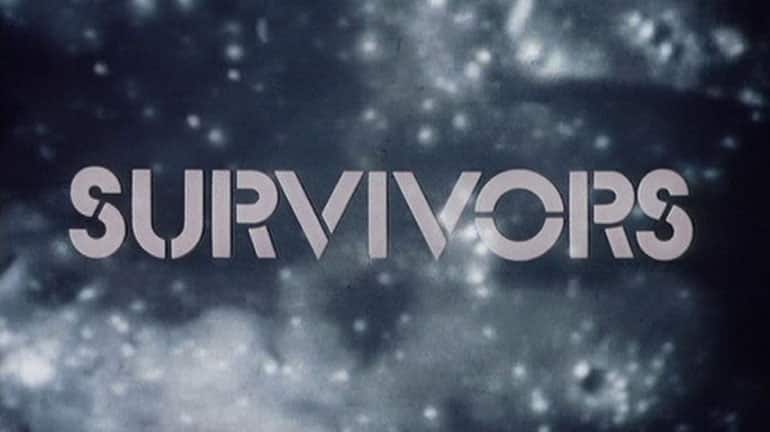Last month, revisited Terry Nation’s cult classic series Survivors — a mid-Seventies BBC drama which eerily prophesied what our future might be like after a devastating plague.
Now embarking on a difficult a radically different second series, Greg and Sam discover that the future for humanity lies in pig farming, candle-making and boiling sea water for salt. But does this ecological messaging make for good drama?
Sam: So here we are Greg, less than a year on in early 1976 — one of the hottest Summers on record — and Survivors is back for an exciting second season.
It’s all change as series creator Terry Nation steps back to make way for a set of new writers, offering a very different direction for the series. We open with the episode Birth of a Hope, and it’s immediately fire and fury for the comfy community at The Grange!
Greg: Yes, Birth of a Hope doesn’t want you to get too cosy, does it? They clearly weren’t given permission to set fire to Hampton Court Castle for some strange reason, so another building that looks nothing like it has to stand in.
The third actor to play Vic Thatcher in as many episodes has a brief cameo, caught in the flames, but we don’t see him die on screen, then we’re told that Charmain, Emma and, er, Pete (who was he?) have snuffed it. This was the writers getting shut of characters they didn’t know what to do with, wasn’t it?
Sam: It’s a swift shakeup and instantly feels less optimistic. Jenny is now heavily pregnant and has to face the very real possibility of giving birth in a freezing barn. It’s a return to feeling very grubby and uncomfortable, which I think the show needed. In some episodes in the first season the women appeared rather well-groomed, modelling the latest C&A collection, complete with nicely shampooed hairstyles.
Greg: Looking for somewhere for Jenny to give birth is all rather biblical, isn’t it? And if it’s a kindly, wise and bearded man you’re after, Denis Lill is back! What do you make of it all? There’s a distinct shift in tone, isn’t there. Greg doesn’t speed on down to Charles Vaughan’s gaff on his moped. It’s all horse and cart, a bit like Steptoe and Son.
Sam: Now it’s grease, grime and freezing cold nights as Greg shepherds what’s left of the community to a settlement at Whitecross [Callow Hill in Monmouthshire]. It’s basically a farming community with a bunch of populated outbuildings. Like The Good Life but without the laughter track and posh neighbours.
It’s great to see Lill back as Charles Vaughan, and they’ve softened his character so he’s not obsessed with breeding now. In fact, he’s in a childless relationship, which is interesting. What do you make of the new ensemble cast?
Greg: I love the return of Denis Lill, because I adore him as an actor, and he’s very, very fine, and completely believable across the spectrum of emotions. Thank goodness they toned down his randy goat ways, but there is a brief recrudescence of his interest in the old “in-out” later in the series. It’s not entirely forgotten. It’s put away for now, though, and audiences instantly warm to lovely, patient Charles. He’s an anti-Greg, who has no patience for anything and prefers to snarl and snap at slackers.
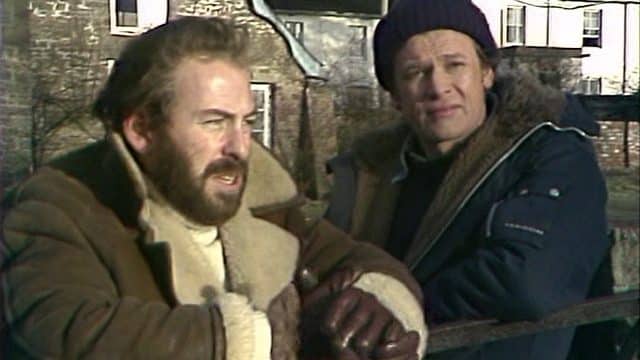
The two are very different characters and this will shape a lot of the drama. At first, Greg doesn’t want to stay; no room for two alpha males. Lucy Fleming (Jenny) had been preggers in real life, so this is neatly used by the writers, but my concern, and I’ll pick up on this, is that Jenny is side-lined in season two, which I think is a huge shame. But for now, it’s a difficult pregnancy, so they have to get to the young medical student…
Sam: Yes, I really like “Doctor” Ruth, played by the late Celia Gregory. She’s a headstrong character with medical knowledge which is instantly seized upon. She also pushes back against Greg’s alpha-male-tempered logic, so she substitutes for Abby’s strength in that regard.
Interesting you say that Lucy Fleming has a baby at this point, as it may explain why she’s less used this year, and spends most of her time boiling mutton fat for candles in the house. She loudly complains about that, and there’s a rather modern hint towards her suffering post-natal depression.
Greg: You’re right about Lucy Fleming – her pregnancy caused a right headache with production, with episodes moved around in shooting sequence to accommodate her, so it is a reason why she is side-lined. I find Charles Vaughan’s “wife”, Pet (played by the late Lorna Lewis), a touch dry, but she grows on me over time.
Sam: There’s also another new character, Hubert, an odious farmhand played by John Abineri. He’s great, very funny, and somewhat fills the gap left by Tom Price?
Greg: John Abineri is a great choice. Hubert is a kind of old-fashioned shepherd, isn’t he? Like Tom Price, he’s relentlessly grumpy, rather selfish, and never a hit with the ladies, much to his continued astonishment.
I really missed Talfryn Thomas when he was written out of the show, for obvious reasons, so it’s nice to have a “mark 2” in Hubert form. Abineri is solid as a rock — he was a very familiar face on TV and was in Doctor Who four times.
So, the second episode, Greater Love, reduced me to tears…
Sam: It’s a great episode! Ruth and Paul have grown close, and Paul volunteers to venture out to bring back some much-needed medication to support her live-saving operation on Jenny as she gives birth. Only, he comes back with a mystery sickness. It’s pretty brutal on poor Paul, isn’t it?
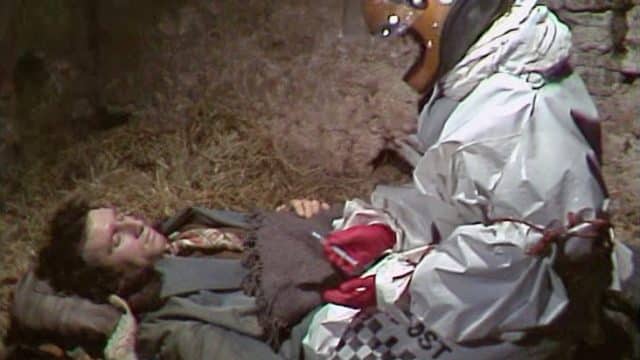
Greg: We discussed Paul in the last series, and we both said how much we loved Chris Tranchell’s character and performance. One thing Survivors did really well was to punch you in the gut, and this is the first of two occasions it happens in season two.
We think Paul’s going to be OK — he returns from a mission to get drugs from Birmingham — but he’s picked up a disease in the city. We learn it’s bubonic plague, and the antibiotics have no effect. Ruth tells him to “self-isolate” — my word — how many times have we heard that phrase recently?
Sam: The gravity of Paul’s sickness is made clear when Ruth has to administer his treatment, which later becomes euthanasia, dressed in plastic with a biker’s helmet on. It’s grim, but a necessary demonstration of how they’re trying to protect the herd.
Greg: Yes, Ruth’s dressed head to foot in home-assembled PPE. I think that’s another reason why Greater Love shook me up so much. It was all so close to home, and another indication that, even with Terry Nation now off the series, it continued to understand the subject matter of virology and survival that it dealt with.
Sam: His fate is nicely foreshadowed, too; Greg was going to make the supply trip, but Paul stops him, knowing Greg has parental responsibilities — an investment in the future. It shows the measure of Paul’s altruism there, in his sacrifice for the common good and the next generation.
Greg: So true. I sobbed when Paul died, even though I knew it was coming, and sobbed again when Jenny decides to call her baby after him, acknowledging that he gave his life so that her infant might live. Is this the first character you really miss? Incidentally, a year later Chris Tranchell would marry hot space babe Leela (Louise Jameson) in a Doctor Who serial in which he is heroic, so a consolation of sorts! We’re not given long to mourn Paul, though, are we? We’re barrelling headlong into a Survivors two-parter!
Sam: I think this is the first two-part cutaway, isn’t it? The Lights of London; and we’re out of the country and back on gritty 16mm film. London looks like a right s***hole.
Greg: Greg and Charles are sold a pack of lies by some visitors who basically turn up to take Ruth to London. It’s another mention of Abby — first one this series? We’re told she’s been reunited with Peter, but can we believe these people?
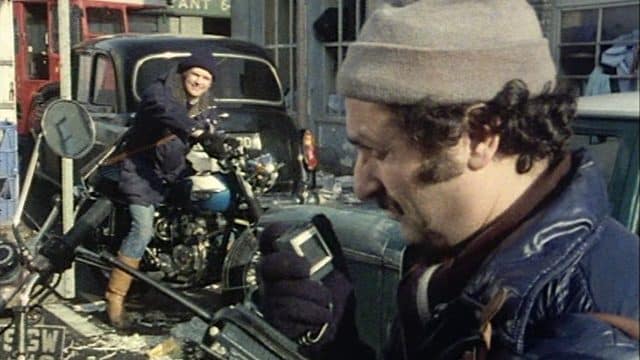
There’s lovely supporting roles for all kinds of familiar faces in this episode. But as we quickly find out, London is swarming with rats, decay, rubbish piled up… power cuts. It’s an absolute disaster area, dangerous, and every man for himself. Thankfully, there was a socialist government at the time, so the crew could just film on the streets as they were without spending any money dressing them or hiring extras.
Sam: You get to see a young David Troughton in a small role, slightly ahead of his father who also appears in this season, too. And the great Nadim Sawalha, who was also filming The Spy Who Loved Me at the time.
But yes, Ruth is basically hoodwinked into going to help Abby, but she’s not in London. Instead, a miserable colony at the Oval cricket ground is dying of the “London sickness”, and Ruth is forced to support their medical effort which aspires to relocate to the Isle of Wight.
Sydney Tafler plays a crooked leader who makes plenty of promises, but you start to wonder if he’s just feathering his own nest whilst London decays around his dinner table. In a nice detail, there’s some killer rats in this, a reference to a Doomwatch episode produced by Terence Dudley, which also starred his son Stephen [John in Survivors].
Greg: I saw that episode! Doomwatch was rather good. Survivors has much better production values, and the return to film really benefits the atmosphere of this two-parter, especially the location footage in the gloomy Underground tunnels.
Roger Lloyd-Pack pops up as the sort of benevolent drop-out he played so well, and he saves Greg and Charles from certain death, but he’s not well-liked by the chap running the operation, Manny. It’s all rather cleverly done, and feels like a mini-feature film of its own. A season two high point? My only gripe is that the deus ex machina ending feels like a slight cop-out. It doesn’t quite work for me, but the establishing episode is terrific.
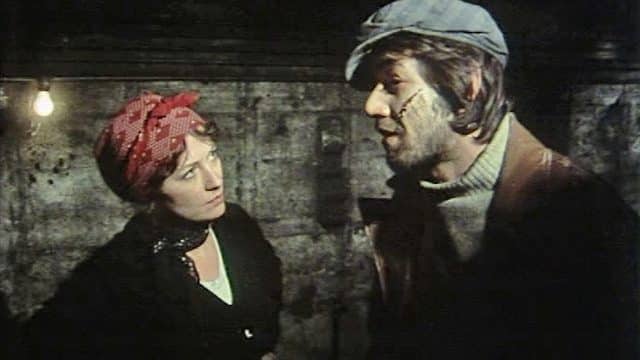
Sam: I think it offers us the only action-cliff-hanger of the series, with a fat rat hanging off Charles’ face. It’s really nasty stuff, and I liked the conclusion: a tense shoot-out on the Underground, which sees our survivors clambering up towards the surface. Some light at the end of the tunnel. Or am I reading too much into it?
As much as I liked the trip into the cesspit of London City, just to remind us why it’s better in the countryside, I was eager to get back to the self-sufficient world-building at Whitecross, with its smaller-scale and optimistic storytelling. The Face of the Tiger is such an example. What did you make of that? It’s one of the episodes which stuck with me.
Greg: I’m afraid it marks a downturn for me. I suspect we’re getting to the areas where we may disagree. I’m not a fan of this episode. Basically, a refined man who reads poetry turns up at the community and wants in. Only it’s revealed that he had, years earlier, murdered a child and was imprisoned for his crime.
I just don’t find credible Jenny’s reaction where she leaps to his defence — she’s a new mother – she would instinctively not give him the benefit of the doubt. The episode is saved by John Line’s excellent performance as Alistair, the shadowy newcomer. But I’m afraid this is the start of a double bill of plodding, naval-gazing episodes where my attention wandered. Do you have a different take?
Sam: I remember having a feeling of unease in my gut as soon as he rocked up, as you say thanks to a sinister and ambiguous performance from John Line. We discover his dreadful past, but in a time where every hand is needed, it puts Greg and Charles in a difficult position. Of course, Greg isn’t quite as quick to banish the guy this time after his experiences in Law and Order, so we go with a much more liberal approach. Perhaps too liberal…
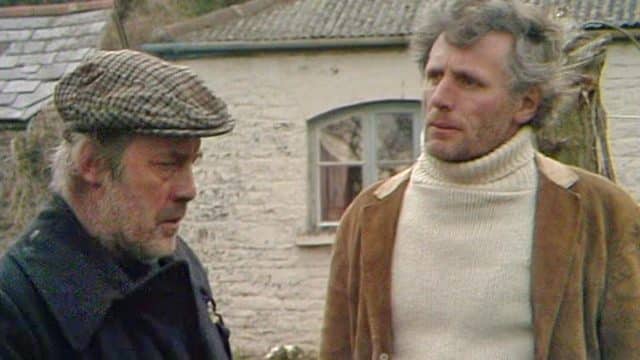
But yes, Jenny’s motivation is all over the place, especially when she says she’ll miss Alistair at the end of the episode. I’d much rather have seen some justified conflict between the mothers and the men in this; perhaps with the women driving the child murderer out. Given that this episode has a similar tone to the following one, I assume you didn’t enjoy The Witch either?
Greg: The Witch is on a par, for me. My beef with it is that the episode centres around a brand new character (Mina). I must say that Delia Paton is excellent in the role – but we’ve never met her before, and suddenly asked to care about her. Not only that but the plot is almost absurdly thin. Hubert is after a bit of fun with Mina, but she rebuffs him. To hurt her feelings, Hubert tells the kids that Mina’s a witch, and it all goes very Hansel and Gretel. Pet gets utterly hysterical, and Charles has to lose his temper and force them all to see sense.
In season one, stories were about life and death decisions. This is a cosy little domestic yarn. I have, like all good obsessives, scored every episode out of ten, so that I can decide how to rank the three seasons once we conclude our odyssey through the archives. The last two episodes for me are 5/10. Am I wrong?
Sam: I’m not running a tracker spreadsheet. But the tension certainly eases up at this point, and we’re rapidly meeting more people at Whitecross, which arguably dilutes the possibility of maintaining strong emotional connections. There’s no clear protagonist now.
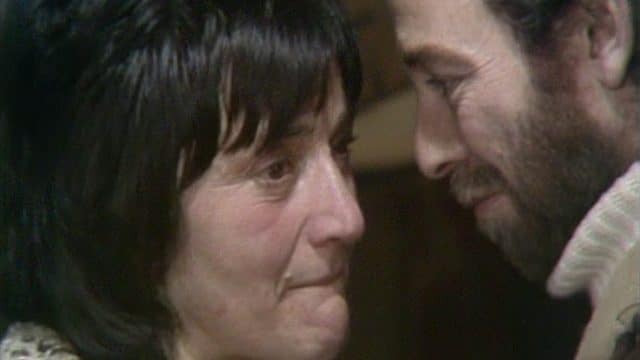
I think the point of the episode was to demonstrate how society had regressed to almost pagan superstition, which could easily become embedded in a new generation such as John and Lizzie who’ll believe anything they’re told. It’s an interesting, if undramatic, return to some spiritual folklore, that’s peppered throughout this season.
Surely things pick up for you in the next episode though? It’s written by Ian “Angry Greg” McCulloch and is naturally an intense action chiller!
Greg: Thank goodness for A Friend in Need, which is the first of McCulloch’s scripts. Only the title is bad!
After trying to get local communities to co-operate, and join Charles’ federation, it turns out that there’s a killer on the loose, specifically targeting women. Greg gets all James Bond about it, and there’s a manhunt, only they need a scapegoat to lure the killer in.
It’s a great standalone episode and it’s all very macho. Things are finally happening again! What do you make of McCulloch’s first contribution to the series as a writer?
Sam: It feels like a first script to some degree, as the pacing is a little uneven on the front end, but there’re some great moments in the second and third acts. Seeing the victims in the crosshairs of a rifle, and hearing some consumptive breathing from the masked killer is all very sinister. It’s economically shot by director Eric Hills.
The episode also taps into one element where I know we’re divided on season two; taking time to develop a cosy new world that could easily be lost again. I don’t want to see the community fail. All the hard work, all the toil, is suddenly as risk of being dashed by something as pointless as a lunatic with a rifle. Any new arrival could undo everything.
I must say, though, the logic behind using Jenny as live bait to draw out the gunman is bonkers: it goes against everything about protecting mothers in the tribe, so far. It’s clearly just to get Jenny downstage and into the action?
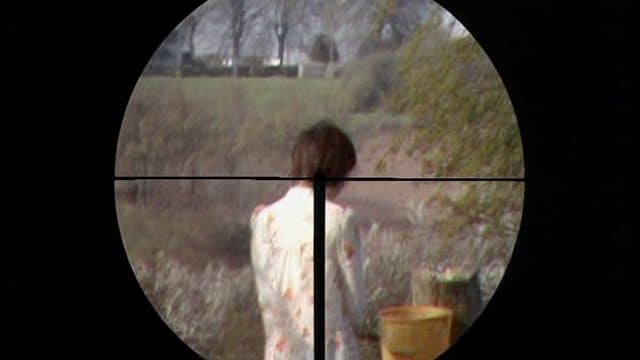
Greg: Yes, I suspect you’re right. In the extra features on the DVD video collection, a 2003 Ian McCulloch expresses how disappointed he was that Lucy Fleming was under-used.
He was also less keen on the scripts with more philosophical ideas behind them, or moral dilemmas. He preferred a tad more action and adventure, so this was his way of re-introducing it, and finally finding something for Jenny to do, even if it is just to stand around in a field waiting for a maniac to attack her.
I referred to his little exchange with Charles about how many men they’d killed in one of our earlier round-ups. Ian McCulloch is really putting his own spin on Greg Preston as the man of action here. It’s a return to form, but can it last?
Sam: Well, I’m still eager to see what happens in the next episode, By Bread Alone. I have a vague memory of it being about a feckless priest with depression, whilst Greg spends 50 minutes nurturing a fart in a binbag. I think it’ll be right up your street.
Greg: Ye-es… I’m not sure it’ll be my cup of tea. But I guess we’ll find out when we fire up the old Videocassette recorder.
Sam: Great. In the meantime, do you want to trade some of my mutton fat and potash candles for salt? And how’s your corned beef situation?
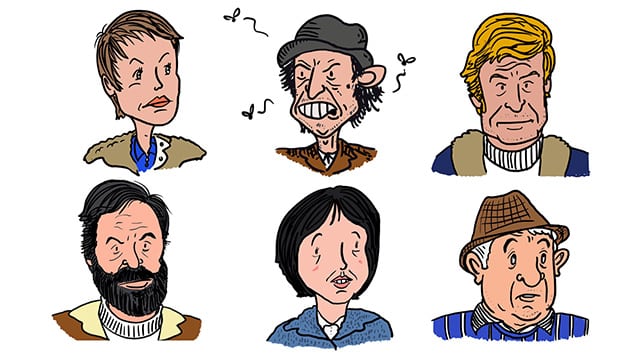
Carry on to the next part of our review of Season Two.


